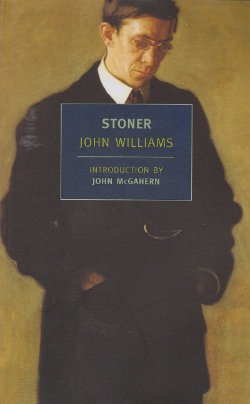 Stoner is, quite possibly, the best novel I’ve ever read. It’s another one that’s been on my radar for a while, following me around, even. I had a feeling I would like it – I just didn’t realize how much. Whatever I do say, though, will in no way do it justice. I should also add a caveat: it’s also one of the most staunchly literary novels I’ve ever read, so that might be unappealing to some. I should also say that you should read the book before going forward because I can’t talk about Stoner without spoilers, and this review is rife with them. You’ve been warned.
Stoner is, quite possibly, the best novel I’ve ever read. It’s another one that’s been on my radar for a while, following me around, even. I had a feeling I would like it – I just didn’t realize how much. Whatever I do say, though, will in no way do it justice. I should also add a caveat: it’s also one of the most staunchly literary novels I’ve ever read, so that might be unappealing to some. I should also say that you should read the book before going forward because I can’t talk about Stoner without spoilers, and this review is rife with them. You’ve been warned.
It’s about a college professor at the University of Missouri. His whole life. As I read the book, I described him as unhappy, but that’s not really it. He moves through his life mostly passively, and life happens to him. At a few points, he stands up for himself and changes what might have been. The novel begins with a sort of epigraph, saying that he’s dead and hardly remembered, and then tells the story of his whole life – how he was born to a poor farming family and sent to school for a degree in agriculture, but he ended up with an English PhD and an assistant professorship. John Williams describes the moment literature hit him beautifully. He gets married, has a child, an affair, retires, dies.
This book is about what is important in life, and to Williams, that seems to be love and duty. It’s also about what’s not important: a professor who becomes head of the department has a personal grudge against him and tries to make his life miserable, but by the end, you know it doesn’t matter. I read somewhere, recently, that literary fiction helps one see everything in shades of gray – instead of in black and white – and Stoner is the perfect example of that idea. Everything Stoner does isn’t good, though he lives his life in the best way he can manage, and then he dies quietly. Williams’s description of his death makes me a little less afraid of it.
Again, this is a very literary novel, though that’s not to say it’s hard to read. The language, most of it, anyway, is simple and direct. There is some academic jargon, but that’s what you might expect from a novel about an English professor. And I understand why it’s not mainstream, though I don’t understand why I hadn’t heard of it until recently. I should have known about it in college.
Maybe I like Stoner so much because it’s so relevant to my life. I considered myself an academic for a long time, and now I’ve fallen away for it. I read it here with a sort of nostalgia, from a bit of a distance. Sure, I still have the thesis hanging over my head (And I will finish it! Eventually.), but now I have a husband, a job, and entirely different responsibilities than I had even a couple of years ago. I usually don’t think so much about books after I read them – I usually close them and move on. Stoner won’t let me do that, though.
I should also probably point out that, literary or not, it’s just good writing, easy to read and complex at the same time. It’s worth reading even if you aren’t the academic type, not that I think it would give you a glimpse into it, but because it’s so good and probably hasn’t gotten the attention it deserves precisely because it is so academic.
The copy I read came from the library, but it’s one of the very few books I’ll have to buy just so I can stare at it, flip through the pages, and read it every so often.
(Where’d #24 go, you ask? I did read A Clash of Kings before this one, and I promise I’ll get to that post in a couple of days. But this one is so much more exciting.)